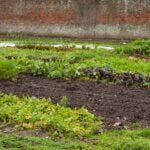Are bears attracted to vegetable gardens? Understanding the behavior of bears in relation to vegetable gardens is crucial for homeowners, gardeners, and wildlife enthusiasts. With their keen sense of smell and continual search for food sources, bears can be drawn to the enticing scents and fresh produce found in gardens. This article will delve into the reasons why bears are attracted to vegetable gardens and the potential risks and dangers that come with their presence.
One of the frequent questions asked by gardeners is, “are bears attracted to vegetable gardens?” The answer lies in understanding the natural instincts and behaviors of these majestic creatures. Exploring this topic will provide valuable insights into bear behavior and enable readers to better protect their gardens while coexisting with wildlife.
It’s essential to recognize that as humans encroach on bear habitats, interactions between bears and people become more common, especially when it comes to home gardening. By gaining a deeper understanding of how and why bears are attracted to vegetable gardens, individuals can take informed steps toward minimizing conflicts with these animals.
The Appeal of Vegetable Gardens to Bears
Vegetable gardens can be an irresistible attraction for bears for several reasons. Understanding why bears are attracted to these gardens is essential in developing effective strategies to deter them.
1. Abundance of food: Vegetable gardens provide an easy and abundant source of nutrition for bears, especially during the crucial period before hibernation when they need to fatten up.
2. Strong sense of smell: Bears have an incredibly keen sense of smell, and the aroma of ripening fruits and vegetables can draw them from miles away.
3. Easy access: Gardens that are not properly secured or protected can provide easy access for bears, making it simple for them to snack on a variety of tasty crops.
To mitigate these attractions, it’s important for gardeners to be aware of the factors that make their vegetable gardens appealing to bears and take proactive measures to deter them. Whether by securing fencing around the garden, using noise deterrents, or installing motion-activated sprinkler systems, there are various methods that can help keep these majestic yet potentially dangerous creatures at a safe distance from valuable crops.
The Risk for Bears and Humans
The presence of bears in vegetable gardens can pose risks for both bears and humans. While it may be appealing to see these wild animals up close, it is important to understand the potential dangers associated with bears entering vegetable gardens.
Property Damage
One of the main concerns when bears enter vegetable gardens is the potential for property damage. Bears have been known to dig up or destroy garden beds in search of food. This can result in significant economic losses for gardeners and farmers. Additionally, bears may trample or damage fences, creating safety hazards and requiring costly repairs.
Human Safety
The presence of bears in vegetable gardens also raises safety concerns for humans. Bears are wild animals and their behavior can be unpredictable, especially when they feel threatened or find a source of food. Encountering a bear in a vegetable garden can put humans at risk of physical harm, particularly if the bear feels cornered or agitated.
Bear Welfare
On the other hand, entering human spaces and encountering food sources can lead to negative consequences for bears as well. When bears become habituated to finding food in human environments, they may lose their natural fear of humans and become more likely to engage in risky behaviors. This can ultimately lead to conflicts with humans and endanger the welfare of the bears themselves.
Preventative Measures
Bears are naturally attracted to vegetable gardens due to the availability of food sources. To keep bears away from vegetable gardens, it is crucial for gardeners to implement preventative measures. One effective strategy is to install electric fencing around the perimeter of the garden.
Electric fencing can act as a physical barrier and deter bears from entering the area. Additionally, it is important to regularly remove ripe fruits and vegetables from the garden to minimize the scent that may attract bears.
Another tip for keeping bears away from vegetable gardens is to eliminate any potential attractants in the area. This includes securing garbage in bear-proof containers, cleaning barbeque grills thoroughly after each use, and removing bird feeders during peak bear activity seasons. By removing these attractants, bears will be less likely to venture near vegetable gardens in search of food.
Furthermore, practicing good garden maintenance can also help in keeping bears away. This involves promptly harvesting ripe fruits and vegetables rather than allowing them to overripen on the vine or plant. Overripe produce emits strong odors that can draw bears into the garden, so harvesting regularly can prevent this issue.
| Preventative Measure | Description |
|---|---|
| Electric Fencing | Install electric fencing around the perimeter of the garden as a physical barrier |
| Removing Attractants | Secure garbage in bear-proof containers, clean barbeque grills thoroughly after each use, and remove bird feeders during peak bear activity seasons |
| Garden Maintenance | Promptly harvest ripe fruits and vegetables to prevent overripe produce from emitting strong odors that can attract bears |
Repellents and Deterrents
There are various methods that can be employed to deter bears from vegetable gardens, helping to ensure the safety of both humans and bears. Understanding these methods is crucial for maintaining harmony between humans and wildlife.
Physical Barriers
One of the most effective ways to keep bears away from vegetable gardens is by implementing physical barriers. This can include electric fencing, sturdy fences, or even motion-activated deterrents such as lights or sound devices. These barriers serve as a direct obstacle for bears, preventing them from easily accessing the garden.
Natural Repellents
Another method to consider is the use of natural repellents that are offensive to bears’ senses. This can include using strong-smelling plants such as lavender or garlic around the perimeter of the garden. Additionally, items like ammonia-soaked rags or predator urine can also act as natural deterrents for bears.
Human Presence
Keeping a human presence in the vicinity of the vegetable garden can also deter bears from entering the area. Bears tend to avoid confrontations with humans, so regularly visiting and making noise in and around the garden can discourage them from approaching.
By exploring and utilizing these different methods of bear deterrents, individuals can protect their vegetable gardens while also ensuring the safety and well-being of local bear populations. It’s important for gardeners to be mindful of their surroundings and take proactive measures to prevent potentially dangerous encounters with these wild animals.
The Importance of Proper Food Storage
Vegetable gardens can be very attractive to bears due to the abundance of food available. Bears have a keen sense of smell and are naturally drawn to the scent of fresh produce. This is especially true during times of food scarcity, such as in the late summer and fall when bears are actively preparing for hibernation. Additionally, vegetable gardens provide easy access to a variety of nutritious foods that can fulfill a bear’s dietary needs.
To avoid attracting bears to your vegetable garden, it is crucial to prioritize proper food storage. Here are some important tips and strategies for storing food properly:
- Use bear-proof containers or storage units specifically designed to keep bears out. This could include heavy-duty bins or lockable storage sheds.
- Keep all harvested fruits and vegetables securely stored in sealed containers within your home or another bear-resistant structure.
- Avoid composting food scraps in open piles – consider using enclosed compost bins that can prevent strong odors from attracting bears.
By taking these preventative measures, you can reduce the likelihood of attracting bears to your property while still enjoying the benefits of a fruitful vegetable garden. Proper food storage not only helps protect your garden but also promotes safety for both humans and wildlife.
Benefits of Coexisting With Bears
Bears are magnificent creatures that play an essential role in the ecosystem. While they may pose a threat to vegetable gardens, there are also benefits to coexisting with these animals. One significant advantage of living in harmony with bears is the opportunity to observe them in their natural habitat.
For many individuals, seeing bears in the wild is a thrilling and memorable experience. It allows people to appreciate the beauty and power of these animals while fostering a deeper connection to nature.
Moreover, coexisting with bears can lead to increased awareness about wildlife conservation and responsible environmental practices. By taking measures to protect vegetable gardens from bear encounters, individuals learn about the importance of preserving habitats and minimizing human-wildlife conflicts. This can translate into greater support for conservation efforts at local and national levels, ultimately benefiting not only bears but also other vulnerable species.
Additionally, understanding how to peacefully coexist with bears fosters a sense of respect for the natural world and promotes sustainable living practices. By implementing strategies to safeguard vegetable gardens without causing harm to bears, individuals develop a greater appreciation for the delicate balance of ecosystems. This can lead to environmentally friendly habits such as composting organic waste and cultivating wildlife-friendly landscaping, contributing to healthier and more biodiverse environments.
| Advantages | Benefits |
|---|---|
| Opportunity to observe bears in their natural habitat | Increased awareness about wildlife conservation |
| Promotion of sustainable living practices | Respect for the natural world |
Conclusion
In conclusion, it is important to recognize that bears are indeed attracted to vegetable gardens for various reasons such as the availability of food and the easy access to it. However, it is crucial for both bears and humans to understand the potential dangers that come with these interactions. By implementing proper preventative measures, such as installing fences, using repellents, and practicing proper food storage, we can significantly reduce the risk of bear encounters in vegetable gardens.
Furthermore, it is essential to emphasize the significance of coexisting with bears while protecting our vegetable gardens. Bears play a vital role in our ecosystem and it is possible to live in harmony with them by being mindful of our surroundings and taking necessary precautions. By understanding their behavior and taking proactive steps to deter them from vegetable gardens, we can ensure the safety of both bears and humans.
Ultimately, managing bear interactions with vegetable gardens requires a combination of awareness, education, and practical solutions. By working towards coexistence and implementing effective strategies for preventing bear encounters in our gardens, we can find a balance that allows us to enjoy our harvest while respecting the natural instincts of these magnificent creatures. With cooperation and commitment to responsible practices, we can minimize conflicts and create a safer environment for both bears and humans.
Frequently Asked Questions
How Do I Keep Bears Out of My Vegetable Garden?
Keeping bears out of your vegetable garden can be done by implementing multiple strategies. One effective method is to install electric fencing around the garden perimeter, as bears are deterred by the mild shock it produces.
Additionally, using motion-activated lights or sprinklers can startle and scare off any approaching bears. It is also important to keep the garden clean and free of ripe produce, as this removes the incentive for bears to enter.
Do Bears Like to Eat Tomatoes?
While bears are largely omnivorous and have been known to consume tomatoes if they come across them, tomatoes are not a primary food source for them. Bears are more attracted to high-calorie foods like nuts, berries, and small mammals. However, given the opportunity, they may still eat tomatoes if available.
What Attracts Bears to Your Yard?
Bears can be attracted to yards by various factors such as easily accessible food sources like unsecured garbage cans, pet food left outside, bird feeders filled with seeds or grains, and fruit trees with ripe fruits. Additionally, compost piles that contain food scraps can also draw in bears.
Properly securing these attractants and removing other potential sources of interest can help discourage bears from frequenting your yard.

If you’re looking to get into vegetable gardening, or are just looking for some tips on how to make your current garden better, then you’ve come to the right place! My name is Ethel and I have been gardening for years. In this blog, I’m going to share with you some of my best tips on how to create a successful vegetable garden.





